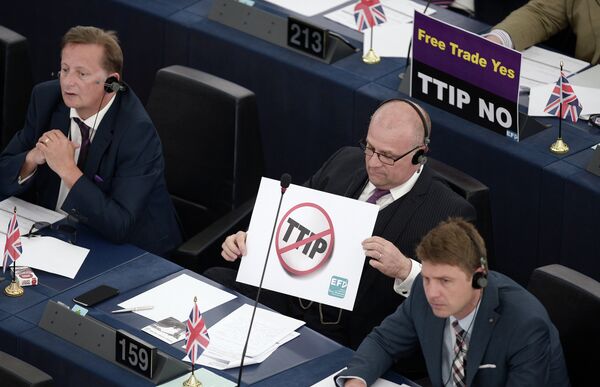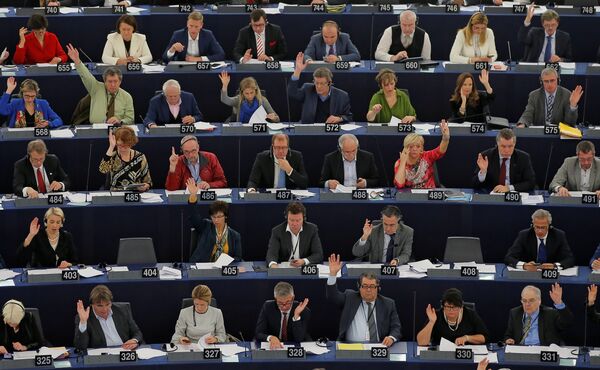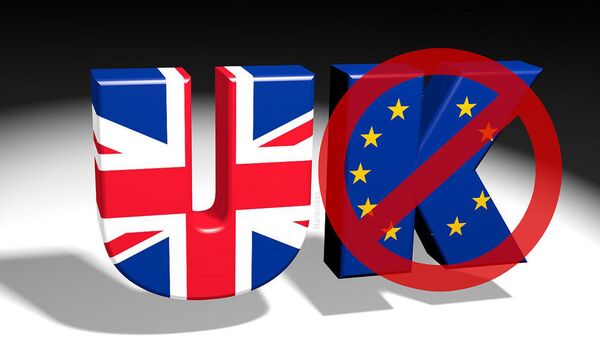Brexit means the EU sheds one of its largest annual contributors — the UK contributes around US$19.3 billion (€18.2bn) — leaving Germany and France far and away the largest donors, at US$25.8 billion (€24.3bn) and US$20.1 billion (€19bn) respectively.
In interviews with local media, Commissioner Oettinger indicated cuts would be made to the EU budget, particularly in the field of agricultural subsidies, but these would be insufficient to cover the shortfall created by the UK's departure, and other countries' contributions may have to rise as a result. He suggested Germany would be obliged to pay at least US$4.8 billion (€4.5bn) extra from 2019.
We will continue our work with all Member States to improve #EUbudget management for the benefit of the #EU citizens #EUdischarge2015 pic.twitter.com/eA3fCmZ0ZM
— Günther H. Oettinger (@GOettingerEU) February 28, 2017
It is not the first time Oettinger has expressed concern about the fiscal impact of Brexit on the EU and his home country, although his forecasts for how much it might cost have escalated over time — for instance, he previously suggested it may cost Germany an extra US$1 billion.
#EUdischarge2015 is a key moment of #accountability 4 spending of #EU taxpayers' money. Read abt #EUbudget procedure https://t.co/S6sgnfwWww
— Günther H. Oettinger (@GOettingerEU) February 28, 2017
Nevertheless, the question of what impact Brexit might have on individual EU Member States, and the bloc overall, has rarely been considered in the mainstream Western media.
Given the UK is the EU's third most populous member state, comprising 12.76 percent of the bloc's overall population, the country is a highly influential player in the European Council and Parliament, and the UK spends more on defense than any other EU country.
The implications could be seismic, although analysis by University College London (UCL) suggests a raft of potentially positive developments.
For one, the Transatlantic Trade and Investment Partnership (TTIP) could be jettisoned outright — the UK was a determined lobbyist in favor of the controversial trade deal, despite the protestations of leaders such as French President Francois Hollande.

Brexit could also increase EU protectionism, as the strength of potentially protectionist member states would grow. Open Europe analysis of Council voting patterns notes that under the Council's Qualified Majority voting system, the Southern protectionist bloc (France, Italy, Spain, Greece, Portugal and Cyprus) and Northern liberal bloc (UK, Germany, Sweden, Denmark, the Netherlands, Finland and the Baltics) are in effective deadlock.
#What if there were a #Brexit? The consequences, challenges and opportunities facing Britain outside the EU. https://t.co/iNXGPuULXk #EURef
— Open Europe (@OpenEurope) February 29, 2016
Without the UK, the collective weight of the liberal bloc would decline, whereas the protectionist bloc would strengthen, producing a less open EU. Brexit would also alter Parliament's party landscape and ideological composition — over 60 percent of the UK's 73 MEPs currently sit with center-right and Eurokceptic groups.
While it's unclear whether the UK's seats will be lost or reallocated, their loss would arguably strengthen the left, as for the first time in years, progressive parties could form majorities without the European People's Party. In an ironic twist, this may mean that if and when the UK is obliged to import policies from the EU, they will be of a more social democratic nature than in the past.

Moreover, Brexit could alter the balance of power within the EU in other ways too — namely, by strengthening Germany's position, while weakening smaller states.
VoteWatch data shows that the UK's main voting allies are Sweden, Denmark and the Netherlands — Germany almost never votes the same way.
UCL contend this in turn will strengthen the Eurozone, which could replace the single market as the EU's core and driving force. The UK has long been a staunch skeptic and critic of the single currency, with its leaders repeatedly emphasizing the need to keep the Eurozone distinct from the EU. British withdrawal by definition means the end of such pressure.
While strengthening some EU interests and objectives, Brexit could also have a deleterious impact in other areas.
“A European Union without the United Kingdom: The Geopolitics of a British Exit from the EU” by @lseideas https://t.co/subCJyAEf5
— George Lominadze (@GeorgeLominadze) February 19, 2016
For instance, Brexit will almost inevitably weaken the EU's global role — the only question is how severely. Britain is the EU's foremost military power, and its membership means the EU can access the country's significant diplomatic network, intelligence capabilities and soft power. For instance, the LSE question whether the EU could have imposed sanctions on Russia without the UK's international strength — and note that post-Brexit, France would be the only major military power in the EU, potentially undermining future development of serious EU military capabilities, such as the long-awaited EU army.
Brexit could even be the long-term trigger of the EU's eventual collapse. The period since the June 23 referendum has seen the rise to prominence of anti-EU politicians in countries such as Austria, Denmark, France, the Netherlands and Sweden.
Should Britain thrive outside the bloc, the case for other countries exiting would be strongly emboldened.





